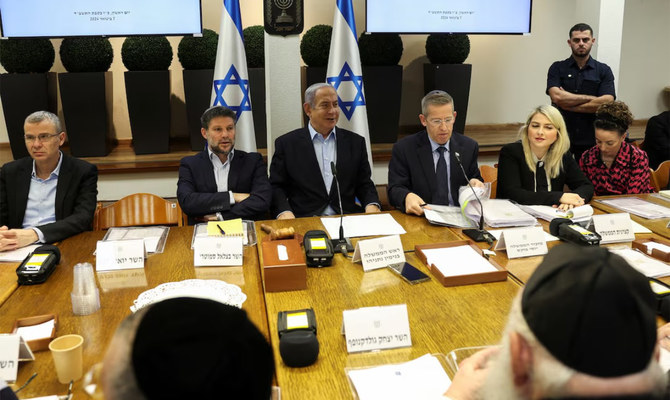Yossi Mekelberg
The greater the challenges Israel faces, the more it becomes apparent that its current government is utterly inept and chaotic, simply not up to the tasks at hand.
Things have become considerably worse since this coalition returned to its far-right, narrow, pre-October form following the departure of Benny Gantz and his National Unity party from the government — and that was only two weeks ago.
Gantz’s departure was inevitable, justified and, arguably, several months overdue. In hindsight it could be quite comfortably asserted that his rush to join the coalition was a mistake, even if it was motivated by a genuine desire to avoid leaving the country in the hands of extremists with messianic delusions and no experience or competency in guiding their country through its worst-ever crisis.
But considering the manner in which this government has presided over the war, the effectiveness of Gantz’s mitigating influence is questionable, especially given that Prime Minister Benjamin Netanyahu, a defendant in a corruption trial and unpopular among the wider public, continues to cling to power despite the interests of the country, and to do so he is ready to let the warmongers in his government influence his decisions on how to conduct the war.
There is no doubt in my mind that the Netanyahu government is endangering the country’s national interests in terms of security, and damaging Israeli society to the extent that it might take years to repair, if that is possible at all.
The war in Gaza is heading in the unfortunate, though all-too-familiar, direction that invasions of this nature usually take. After inflicting immeasurable devastation, not only on the military capabilities of Hamas but even more so on ordinary Gazans, the Israeli military is, for all intents and purposes, occupying this tiny and densely populated strip of land that it abandoned nearly two decades ago after it became obvious that remaining there was a security burden.
Now, and under much worse conditions, Israel occupies most of Gaza and is engaged in guerrilla warfare with Hamas that is exacting a heavy price. Tragically, and at the expense of ordinary Gazans, Hamas has a strategy-less Israel exactly where it wants it: engaged in a prolonged, low-intensity war in which its army loses soldiers and uses excessively disproportionate force in retaliation that exacerbates the humanitarian crisis for ordinary Gazans and results in Israel becoming increasingly internationally isolated and domestically divided.
As if this were not enough, concurrent tensions on the border with Lebanon are reaching a fever pitch, to the extent that most observers warn that a full-scale confrontation between Israel and Hezbollah is a matter of “when” rather than “if.”
To prepare for this, the Israeli government has raised the number of reservists the army is authorized to call up to 350,000.
Israel’s military chief of staff, Lt. Gen. Herzi Halevi, did not mince words this month when he announced that Israel was close to reaching a decision regarding a response to Hezbollah’s daily attacks on northern Israel. Soon after, Netanyahu joined in with a warning that the country was “prepared for an extremely powerful action in the north.”
In the early days of the war in Gaza, Hezbollah was careful to concentrate on merely playing a supporting role in the war between Hamas and Israel, showing solidarity through limited provocations along the Israeli-Lebanese border. As the tit-for-tat continues along that border, the vast majority of Israelis living close to it have left their homes and become displaced. Meanwhile, it is estimated that Hezbollah has lost more than 300 of its fighters and commanders in the clashes.
This confrontation now runs the risk of escalating for its own reasons, regardless of whether Israel reaches a ceasefire agreement with Hamas in Gaza. Hezbollah is increasingly brazen and recently released a video of an Israeli military base at the Port of Haifa with missile ships visible, claiming that the footage was captured using an undetected drone that was able to safely return to Lebanon. This can only be interpreted as a warning that it can — and will if necessary — penetrate deep into Israeli territory to hit highly strategic targets.
What the country requires under such circumstances, when there is the painful, daily loss of young lives, when many of its soldiers are injured or suffering from post-traumatic stress disorder, and when many of the Oct. 7 hostages have yet to be returned, is a selfless and able government.
The economy has also been hit hard because so many reservists are serving for months on end in the military, accompanied by a marked decrease in tourism and the reluctance of many companies abroad to do business with Israel in its current form.
With the national mood at an all-time low, Israel needs a unifying government that will put the interests of the country above its own political survival but that is the direct opposite of what it actually has.
Last week, on a day on which eight more soldiers were killed in Gaza, the coalition passed a bill that continues to ensure ultraorthodox youths are exempt from conscription. Netanyahu was all smiles when the vote on this bill in the Knesset ended in victory for his coalition, while at the same time eight families were being told about the loss of their loved ones. Many more young Israelis will now have to serve longer because others will not serve at all.
This insensitive and reckless behavior has struck a raw nerve among Israelis and it does not stop there. A corrupt bill relating to the appointment of rabbis is being pushed in the Knesset. Another bill that would give more power to the minister of national security with regard to police investigations — the minister in this case being the convicted criminal Itamar Ben Gvir — was deliberated in the High Court of Justice at the same time police were becoming increasingly violent in their responses to protesters, including the families of Oct. 7 hostages.
This is the unfortunate reality of Israel under its present government: It is becoming more deeply embroiled in wars it cannot win, governed by an increasingly authoritarian prime minister and government.
There is only so much that a society can and should tolerate, and there is only so much that can be demanded of a relatively small part of society to carry a country’s security and economic burdens by those who are exploiting their own political power and the weakness of a prime minister who will do anything to remain in power and avoid justice in his corruption trial, before that society breaks down or rises up.







